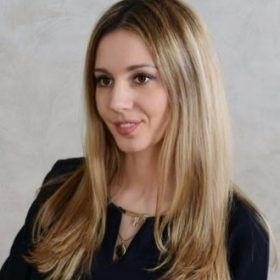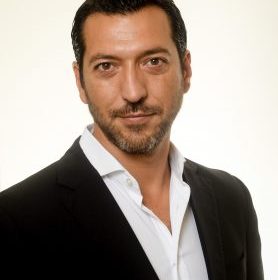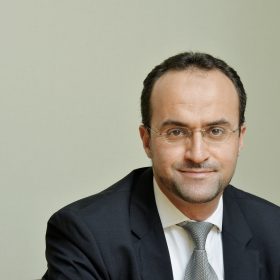Thursday 26th March 2020

Andrea Nardon:
Partner, Head of Quant, Sarasin & Partners
Andrea Nardon: Partner, Head of Quant, Sarasin & Partners
Andrea has just under 20 years of experience as a Quantitative Analyst, and joined Sarasin & Partners in 2006 to manage and develop the systematic franchise. He is passionate about quantitative research and is currently leading a variety of projects related to factor investing, artificial intelligence and market structures.
Prior to joining Sarasin & Partners, Andrea worked as a portfolio manager for Deka Investment in Frankfurt, and before that as a quantitative analyst for Commerzbank. He holds a degree in Economics from the University of Venice, and upon graduation spent a year in the Department of Mathematics to study the application of neural networks and fuzzy logic to equity time series. Andrea codes in multiple languages and uses MATLAB extensively.
Topics:
- What is the current state of utilisation of machine learning in finance?
- What are the distinct features of machine learning problems in finance compared to other industries?
- What are the best practices to overcome these difficulties?
- What’s the evolution of a team using machine learning in terms of day to day operations?
- Are we becoming more software engineers than quants?
- What is a typical front office ‘Quant’ skillset going to look like in three to five years time?
- How do we deal with model risk in machine learning case?
- How is machine learning expected to be regulated?
- Is there a way to make it more explainable?
- Where do you think alternative data fits in with the vogue for machine learning?
- Have you used alternative data?
- Is it more for buy side or sell side.
- What applications can you list among its successes?
- How much value is it adding over and above the “classical” techniques such as linear regression, convex optimisation, etc.?
- Do you see high-performance computing (HPC) as a major enabler of machine learning?
- What advances in HPC have caused the most progress?
- What do you see as the most important machine learning techniques for the future?
- What are the main pitfalls of using Machine Learning currently in trading strategies?
- What new insights can Machine Learning offer into the analysis of financial time series?
- Discuss the potential of Deep Learning in algorithmic trading?
- Do you think machine learning and HPC will transform finance 5-10 years from now?
- If so, how do you envisage this transformation?
- Can you anticipate any pitfalls that we should watch out for.
- Discuss quantum computing in quant finance:
- Breakthroughs
- Applications
- Future uses

Iuliia Shpak:
Quant Strategies Specialist at Sarasin & Partners LLP
Iuliia Shpak: Quant Strategies Specialist at Sarasin & Partners LLP
In her multifaceted role, Iuliia extensively focuses on quant investment solutions for institutional asset owners, in particular SWFs and large pension funds and contributes to internal research and selection of external quant managers.
Iuliia’s research experience covers market anomalies, speculative bubbles, volatility modelling and systematic risk factors in equities and commodity futures.
Iuliia serves as an Adjunct Researcher at the World Pensions Council and Member of Scientific Council at the CBBA-Europe. Iuliia holds MSc in Operational Research and PhD in Finance.
Iuliia frequently delivers guest lectures at the London School of Economics (LSE) and other academic institutions.

Priti Sinha:
Head of SAF Analytics, NatWest Markets
Priti Sinha: Head of SAF Analytics, NatWest Markets
Dr Priti Sinha is a PhD in Pure Mathematics and Theoretical Computer Science. She has over 12 years’ experience as a Fixed Income and Hybrids Quant at NatWest Markets. Over the years, she has developed several models for these divisions and she now heads the SAF Analytics team at NWM. Priti is responsible for core analytics, the curves and algorithms used in pricing, hedging and risk management across all asset classes in NWM.
Automation is her big focus; she and her team are engaged in a range of automation initiatives across the Bank. She is making Quant skills available beyond the traditional trading floor, to other non-trading sections of the bank.
Outside her work Priti enjoys spending time with her 6 year old twins and brainstorming with her husband, who is a founder of an IOT & Tech start-up.

Tony Guida:
Executive Director – Senior Quant Research, RAM Active Investments
Tony Guida: Executive Director – Senior Quant Research, RAM Active Investments
Tony Guida is a Quantitative Portfolio Manager and researcher. Tony’s work is focused primarily on extracting market inefficiencies from different sources from traditional fundamentals, market signals, alternative data, and machine learning. His expertise is in mid to low frequency in equities.
Tony started his career at Unigestion in 2006 where he joined the quantitative equity low volatility team to work as a research analyst. He evolved into a member of the research and investment committee for Minimum Variance Strategies, where he led the factor investing research group for institutional clients. In 2015, he moved to Edhec Risk Scientific Beta as a Senior Consultant for Risk allocation and factor strategies before going to a major UK pension fund in 2016 to build the in-house systematic equity, co-managing 6 billion GBP as a senior quantitative portfolio manager. He joined RAM-Active Investments in January 2019.
Tony holds a Bachelor and Master degrees in Econometry and Finance from the University of Savoy France.
Tony is editor-in-chief for the Journal of Machine Learning in Finance and he is chair of the EMEA machineByte Think Tank. Tony co-wrote and edited the book “Big Data and Machine Learning in Quantitative Investment” Wiley 2018 and is an advisory board member for the Financial Data Professional Institute and a lecturer for Machine Learning at the CQF Institute.

Miquel Noguer Alonso:
Co – Founder and Chief Science Officer, Artificial Intelligence Finance Institute – AIFI
Miquel Noguer Alonso: Co – Founder and Chief Science Officer, Artificial Intelligence Finance Institute – AIFI
Miquel Noguer is a financial markets practitioner with more than 20 years of experience in asset management, he is currently Head of Development at Global AI ( Big Data Artificial Intelligence in Finance company ) and Head on Innovation and Technology at IEF.
He worked for UBS AG (Switzerland) as Executive Director.for the last 10 years. He worked as a Chief Investment Office and CIO for Andbank from 2000 to 2006.
He is professor of Big Data in Finace at ESADE and Adjunct Professor at Columbia University teaching Asset Allocation, Big Data in Finance and Fintech. He received an MBA and a Degree in business administration and economics in ESADE in 1993. In 2010 he earned a PhD in quantitative finance with a Summa Cum Laude distinction (UNED – Madrid Spain).

Jörg Kienitz:
Partner, Quaternion Risk Management
Jörg Kienitz: Partner, Quaternion Risk Management
Previously: Director FSI Assurance Deloitte GmbH and Co-Head of Quant Unit, Head of Quantitative Analytics, Dt. Postbank AG, Senior System Architect, Postbank Systems AG Financial Consultant, Reuters; Academic: Adj. Assoc. Prof. UCT, PD University of Wuppertal, PhD Math., Diploma Math. Books (Wiley): (A) Monte Carlo Frameworks in C++ (B) Financial Modelling – Theory, Implementation and Practice with Matlab Code, (Palgrave McMillan) (C) Interest Rate Derivatives Explained – Part I

Vladimir Piterbarg:
MD, Head of Quantitative Analytics and Quantitative Development, NatWest Markets
Vladimir Piterbarg: MD, Head of Quantitative Analytics and Quantitative Development at NatWest Markets

Alexei Kondratyev:
Managing Director, Head of Data Analytics, Standard Chartered Bank
Alexei Kondratyev: Managing Director, Head of Data Analytics, Standard Chartered Bank
In his role as Managing Director and Head of Data Analytics at Standard Chartered Bank, Alexei is responsible for providing data analytics services to Financial Markets sales and trading.
He joined Standard Chartered Bank in 2010 from Barclays Capital where he managed a model development team within Credit Risk Analytics. Prior to joining Barclays Capital in 2004, he was a senior quantitative analyst at Dresdner Bank in Frankfurt.
Alexei holds MSc in Theoretical Nuclear Physics from the University of Kiev and PhD in Mathematical Physics from the Institute for Mathematics, National Academy of Sciences of Ukraine.

Iuliia Shpak:
Quant Strategies Specialist at Sarasin & Partners LLP
Iuliia Shpak: Quant Strategies Specialist at Sarasin & Partners LLP
In her multifaceted role, Iuliia extensively focuses on quant investment solutions for institutional asset owners, in particular SWFs and large pension funds and contributes to internal research and selection of external quant managers.
Iuliia’s research experience covers market anomalies, speculative bubbles, volatility modelling and systematic risk factors in equities and commodity futures.
Iuliia serves as an Adjunct Researcher at the World Pensions Council and Member of Scientific Council at the CBBA-Europe. Iuliia holds MSc in Operational Research and PhD in Finance.
Iuliia frequently delivers guest lectures at the London School of Economics (LSE) and other academic institutions.

Harsh Prasad:
Vice President, Morgan Stanley
Harsh Prasad: Vice President, Morgan Stanley
Harsh currently works with Morgan Stanley in Quant Analytics Group. He started his career as a programmer focussed on developing data driven algos in the areas of speech recognition, image processing and bioinformatics. He then moved to financial risk management and over the last 12 years has worked in various roles through the life cycle of models. In these roles, he has been continuously enthusiastic to applying machine learning in problems related to behavioural assumptions, data quality, recommender systems, model benchmarking and text analytics. His current role requires him reviewing all Machine Learning models used by the firm and providing direction to shaping AIML governance framework and strategy. He is also a visiting lecturer with universities and training institutions.

Miquel Noguer Alonso:
Co – Founder and Chief Science Officer, Artificial Intelligence Finance Institute – AIFI
Miquel Noguer Alonso: Co – Founder and Chief Science Officer, Artificial Intelligence Finance Institute – AIFI
Miquel Noguer is a financial markets practitioner with more than 20 years of experience in asset management, he is currently Head of Development at Global AI ( Big Data Artificial Intelligence in Finance company ) and Head on Innovation and Technology at IEF.
He worked for UBS AG (Switzerland) as Executive Director.for the last 10 years. He worked as a Chief Investment Office and CIO for Andbank from 2000 to 2006.
He is professor of Big Data in Finace at ESADE and Adjunct Professor at Columbia University teaching Asset Allocation, Big Data in Finance and Fintech. He received an MBA and a Degree in business administration and economics in ESADE in 1993. In 2010 he earned a PhD in quantitative finance with a Summa Cum Laude distinction (UNED – Madrid Spain).

Youssef Elouerkhaoui:
Managing Director, Head of Credit Derivatives, CITI
Youssef Elouerkhaoui, Managing Director, Head of Credit Derivatives, CITI
Youssed Elouerkhaoui is the global Head of Credit Quantitive Analysis at Citi. His group supports all aspects of modelling and product development across desks, thais includes: Flow Credit Trading, Correlation Trading, CDOs, Exotics and Emering Markets.
He also supports CVA, Funding and Regulatory Capital for Credit Markets. Prior to this, he was a Director in the Fixed Income Derivatives Quantitative Research Group at UBS, where he was in charge of developing and implementing models for the Structured Credit Desk. Before joining UBS, Youssef was a Quantitative Research Analyst at Credit Lyonnais supporting the Interest Rates Exotics business. He has also worked as a Senior Consultant in the Risk Analytics and Research Group at Ernst & Young. He is a graduate of Ecole Centrale Paris and he holds a PhD in Mathematics from Paris-Dauphine University.
- Kolmogorov-Arnold Theorem and asymptotics
- Control variate functions with the right asymptotics
- Neural networks with zero asymptotics
- Numerical experiments

Vladimir Piterbarg:
MD, Head of Quantitative Analytics and Quantitative Development, NatWest Markets
Vladimir Piterbarg: MD, Head of Quantitative Analytics and Quantitative Development at NatWest Markets

Thiyagu Dhandapani:
Quantitative Analyst at ABN AMRO CLEARING Bank
Thiyagu Dhandapani: Quantitative Analyst at ABN AMRO CLEARING Bank
I am a Senior Quantitative Analyst at ABN AMRO CLEARING Bank, and have been developing financial risk models since 2013. ABN AMRO Clearing Bank is recognised as a leading provider for integrated solutions in the domain of execution, clearing, custody, financing and risk management across asset classes, on a wide range of markets globally. Part of ABN AMRO Group, ABN AMRO Clearing has 11 offices globally employing more than 800 staff. ABN AMRO Clearing services clients on 160+ exchanges, MTFs, dark pools and FX liquidity centres and consistently ranks as a top 3 clearer in most time zones. I am currently employing machine learning to do volatility prediction, liquidity forecast and anomaly detection in input data.
I have done my Bachelor’s in Electronics and Communication Engineering and Master’s in Quantitative Finance at Duisenberg school of finance / Vrije Universiteit.
• Computation: Classical versus quantum logic gates
• Why quantum computing is more powerful
• Quantum Neural Network (QNN)
• Born Machine and Boltzmann Machine
• Quantum machine learning in practice

Alexei Kondratyev:
Managing Director, Head of Data Analytics, Standard Chartered Bank
Alexei Kondratyev: Managing Director, Head of Data Analytics, Standard Chartered Bank
In his role as Managing Director and Head of Data Analytics at Standard Chartered Bank, Alexei is responsible for providing data analytics services to Financial Markets sales and trading.
He joined Standard Chartered Bank in 2010 from Barclays Capital where he managed a model development team within Credit Risk Analytics. Prior to joining Barclays Capital in 2004, he was a senior quantitative analyst at Dresdner Bank in Frankfurt.
Alexei holds MSc in Theoretical Nuclear Physics from the University of Kiev and PhD in Mathematical Physics from the Institute for Mathematics, National Academy of Sciences of Ukraine.
Thursday 26th March 2020

Andrea Nardon:
Partner, Head of Quant, Sarasin & Partners
Andrea Nardon: Partner, Head of Quant, Sarasin & Partners
Andrea has just under 20 years of experience as a Quantitative Analyst, and joined Sarasin & Partners in 2006 to manage and develop the systematic franchise. He is passionate about quantitative research and is currently leading a variety of projects related to factor investing, artificial intelligence and market structures.
Prior to joining Sarasin & Partners, Andrea worked as a portfolio manager for Deka Investment in Frankfurt, and before that as a quantitative analyst for Commerzbank. He holds a degree in Economics from the University of Venice, and upon graduation spent a year in the Department of Mathematics to study the application of neural networks and fuzzy logic to equity time series. Andrea codes in multiple languages and uses MATLAB extensively.
Topics:
- What is the current state of utilisation of machine learning in finance?
- What are the distinct features of machine learning problems in finance compared to other industries?
- What are the best practices to overcome these difficulties?
- What’s the evolution of a team using machine learning in terms of day to day operations?
- Are we becoming more software engineers than quants?
- What is a typical front office ‘Quant’ skillset going to look like in three to five years time?
- How do we deal with model risk in machine learning case?
- How is machine learning expected to be regulated?
- Is there a way to make it more explainable?
- Where do you think alternative data fits in with the vogue for machine learning?
- Have you used alternative data?
- Is it more for buy side or sell side.
- What applications can you list among its successes?
- How much value is it adding over and above the “classical” techniques such as linear regression, convex optimisation, etc.?
- Do you see high-performance computing (HPC) as a major enabler of machine learning?
- What advances in HPC have caused the most progress?
- What do you see as the most important machine learning techniques for the future?
- What are the main pitfalls of using Machine Learning currently in trading strategies?
- What new insights can Machine Learning offer into the analysis of financial time series?
- Discuss the potential of Deep Learning in algorithmic trading?
- Do you think machine learning and HPC will transform finance 5-10 years from now?
- If so, how do you envisage this transformation?
- Can you anticipate any pitfalls that we should watch out for.
- Discuss quantum computing in quant finance:
- Breakthroughs
- Applications
- Future uses

Iuliia Shpak:
Quant Strategies Specialist at Sarasin & Partners LLP
Iuliia Shpak: Quant Strategies Specialist at Sarasin & Partners LLP
In her multifaceted role, Iuliia extensively focuses on quant investment solutions for institutional asset owners, in particular SWFs and large pension funds and contributes to internal research and selection of external quant managers.
Iuliia’s research experience covers market anomalies, speculative bubbles, volatility modelling and systematic risk factors in equities and commodity futures.
Iuliia serves as an Adjunct Researcher at the World Pensions Council and Member of Scientific Council at the CBBA-Europe. Iuliia holds MSc in Operational Research and PhD in Finance.
Iuliia frequently delivers guest lectures at the London School of Economics (LSE) and other academic institutions.

Priti Sinha:
Head of SAF Analytics, NatWest Markets
Priti Sinha: Head of SAF Analytics, NatWest Markets
Dr Priti Sinha is a PhD in Pure Mathematics and Theoretical Computer Science. She has over 12 years’ experience as a Fixed Income and Hybrids Quant at NatWest Markets. Over the years, she has developed several models for these divisions and she now heads the SAF Analytics team at NWM. Priti is responsible for core analytics, the curves and algorithms used in pricing, hedging and risk management across all asset classes in NWM.
Automation is her big focus; she and her team are engaged in a range of automation initiatives across the Bank. She is making Quant skills available beyond the traditional trading floor, to other non-trading sections of the bank.
Outside her work Priti enjoys spending time with her 6 year old twins and brainstorming with her husband, who is a founder of an IOT & Tech start-up.

Tony Guida:
Executive Director – Senior Quant Research, RAM Active Investments
Tony Guida: Executive Director – Senior Quant Research, RAM Active Investments
Tony Guida is a Quantitative Portfolio Manager and researcher. Tony’s work is focused primarily on extracting market inefficiencies from different sources from traditional fundamentals, market signals, alternative data, and machine learning. His expertise is in mid to low frequency in equities.
Tony started his career at Unigestion in 2006 where he joined the quantitative equity low volatility team to work as a research analyst. He evolved into a member of the research and investment committee for Minimum Variance Strategies, where he led the factor investing research group for institutional clients. In 2015, he moved to Edhec Risk Scientific Beta as a Senior Consultant for Risk allocation and factor strategies before going to a major UK pension fund in 2016 to build the in-house systematic equity, co-managing 6 billion GBP as a senior quantitative portfolio manager. He joined RAM-Active Investments in January 2019.
Tony holds a Bachelor and Master degrees in Econometry and Finance from the University of Savoy France.
Tony is editor-in-chief for the Journal of Machine Learning in Finance and he is chair of the EMEA machineByte Think Tank. Tony co-wrote and edited the book “Big Data and Machine Learning in Quantitative Investment” Wiley 2018 and is an advisory board member for the Financial Data Professional Institute and a lecturer for Machine Learning at the CQF Institute.

Miquel Noguer Alonso:
Co – Founder and Chief Science Officer, Artificial Intelligence Finance Institute – AIFI
Miquel Noguer Alonso: Co – Founder and Chief Science Officer, Artificial Intelligence Finance Institute – AIFI
Miquel Noguer is a financial markets practitioner with more than 20 years of experience in asset management, he is currently Head of Development at Global AI ( Big Data Artificial Intelligence in Finance company ) and Head on Innovation and Technology at IEF.
He worked for UBS AG (Switzerland) as Executive Director.for the last 10 years. He worked as a Chief Investment Office and CIO for Andbank from 2000 to 2006.
He is professor of Big Data in Finace at ESADE and Adjunct Professor at Columbia University teaching Asset Allocation, Big Data in Finance and Fintech. He received an MBA and a Degree in business administration and economics in ESADE in 1993. In 2010 he earned a PhD in quantitative finance with a Summa Cum Laude distinction (UNED – Madrid Spain).

Jörg Kienitz:
Partner, Quaternion Risk Management
Jörg Kienitz: Partner, Quaternion Risk Management
Previously: Director FSI Assurance Deloitte GmbH and Co-Head of Quant Unit, Head of Quantitative Analytics, Dt. Postbank AG, Senior System Architect, Postbank Systems AG Financial Consultant, Reuters; Academic: Adj. Assoc. Prof. UCT, PD University of Wuppertal, PhD Math., Diploma Math. Books (Wiley): (A) Monte Carlo Frameworks in C++ (B) Financial Modelling – Theory, Implementation and Practice with Matlab Code, (Palgrave McMillan) (C) Interest Rate Derivatives Explained – Part I

Vladimir Piterbarg:
MD, Head of Quantitative Analytics and Quantitative Development, NatWest Markets
Vladimir Piterbarg: MD, Head of Quantitative Analytics and Quantitative Development at NatWest Markets

Alexei Kondratyev:
Managing Director, Head of Data Analytics, Standard Chartered Bank
Alexei Kondratyev: Managing Director, Head of Data Analytics, Standard Chartered Bank
In his role as Managing Director and Head of Data Analytics at Standard Chartered Bank, Alexei is responsible for providing data analytics services to Financial Markets sales and trading.
He joined Standard Chartered Bank in 2010 from Barclays Capital where he managed a model development team within Credit Risk Analytics. Prior to joining Barclays Capital in 2004, he was a senior quantitative analyst at Dresdner Bank in Frankfurt.
Alexei holds MSc in Theoretical Nuclear Physics from the University of Kiev and PhD in Mathematical Physics from the Institute for Mathematics, National Academy of Sciences of Ukraine.

Tony Guida:
Executive Director – Senior Quant Research, RAM Active Investments
Tony Guida: Executive Director – Senior Quant Research, RAM Active Investments
Tony Guida is a Quantitative Portfolio Manager and researcher. Tony’s work is focused primarily on extracting market inefficiencies from different sources from traditional fundamentals, market signals, alternative data, and machine learning. His expertise is in mid to low frequency in equities.
Tony started his career at Unigestion in 2006 where he joined the quantitative equity low volatility team to work as a research analyst. He evolved into a member of the research and investment committee for Minimum Variance Strategies, where he led the factor investing research group for institutional clients. In 2015, he moved to Edhec Risk Scientific Beta as a Senior Consultant for Risk allocation and factor strategies before going to a major UK pension fund in 2016 to build the in-house systematic equity, co-managing 6 billion GBP as a senior quantitative portfolio manager. He joined RAM-Active Investments in January 2019.
Tony holds a Bachelor and Master degrees in Econometry and Finance from the University of Savoy France.
Tony is editor-in-chief for the Journal of Machine Learning in Finance and he is chair of the EMEA machineByte Think Tank. Tony co-wrote and edited the book “Big Data and Machine Learning in Quantitative Investment” Wiley 2018 and is an advisory board member for the Financial Data Professional Institute and a lecturer for Machine Learning at the CQF Institute.

Tony Guida:
Executive Director – Senior Quant Research, RAM Active Investments
Tony Guida: Executive Director – Senior Quant Research, RAM Active Investments
Tony Guida is a Quantitative Portfolio Manager and researcher. Tony’s work is focused primarily on extracting market inefficiencies from different sources from traditional fundamentals, market signals, alternative data, and machine learning. His expertise is in mid to low frequency in equities.
Tony started his career at Unigestion in 2006 where he joined the quantitative equity low volatility team to work as a research analyst. He evolved into a member of the research and investment committee for Minimum Variance Strategies, where he led the factor investing research group for institutional clients. In 2015, he moved to Edhec Risk Scientific Beta as a Senior Consultant for Risk allocation and factor strategies before going to a major UK pension fund in 2016 to build the in-house systematic equity, co-managing 6 billion GBP as a senior quantitative portfolio manager. He joined RAM-Active Investments in January 2019.
Tony holds a Bachelor and Master degrees in Econometry and Finance from the University of Savoy France.
Tony is editor-in-chief for the Journal of Machine Learning in Finance and he is chair of the EMEA machineByte Think Tank. Tony co-wrote and edited the book “Big Data and Machine Learning in Quantitative Investment” Wiley 2018 and is an advisory board member for the Financial Data Professional Institute and a lecturer for Machine Learning at the CQF Institute.
The computation of risk metrics poses a huge computational challenge to banks. Many different techniques have been developed and implemented in the last few years to try and tackle the problem. We focus on Chebyshev tensors enhanced by machine learning, showing why they are such powerful pricing approximators in risk calculations. We show how the presented unique mix of techniques can be applied in different calculations. We illustrate with Numerical results obtained in a tier-1 bank internal systems the computational gains these techniques bring to FRTB IMA. In particular, We will give special attention on how to side-step the curse of dimensionality and how machine learning techniques can be used to boost Chebyshev tensors.

Mariano Zeron:
Head of Research and Development: MoCaX Intelligence
Mariano Zeron: Head of Research and Development: MoCaX Intelligence
Mariano leads our Research & Development work. He has vast experience in Chebyshev Spectral Decomposition, machine-learning and related disciplines, and their application to quantitative problems in the financial markets. Mariano holds a Ph.D. in Mathematics from Cambridge University.

Jos Gheerardyn:
Co-founder and CEO, Yields.io
Jos Gheerardyn: Co-founder and CEO of Yields.io
Jos is the co-founder and CEO of Yields.io. Prior to his current role he has been active in quantitative finance both as a manager and as an analyst. Over the past 15 years he has been working with leading international investment banks as well as with award winning start-up companies. He is the author of multiple patents applying quantitative risk management techniques on imbalance markets. Jos holds a PhD in superstring theory from the University of Leuven.
- What do we mean by “explaining” a model?
- Random forests tell us what’s important, but they don’t tell us why.
- Local and global approaches to model explainability
- Should one simplify a model to make it more explainable?

David Jessop:
David Jessop: Global Head of Quantitative Research, UBS Investment Bank
Until recently David Jessop was the Global Head of Equities Quantitative Research at UBS. His areas of research include portfolio analysis and construction, style analysis and risk modelling. He also helps clients understand, use and implement the quantitative tools available from UBS. David joined UBS in 2002. Prior to this, he spent seven years at Citigroup as Head of Global Quantitative Marketing. Before moving to the sell side he spent six years at Morgan Grenfell Asset Management, where he managed index funds, asset allocation funds and also an option overwriting fund.
David graduated from Trinity College, Cambridge with an MA in Mathematics.
Presenter to be confirmed
- Introduction to Model Validation
- Key Aspects of Model Validation for ML
- Model Selection
- Network types
- Network Topologies
- Comparison for different models
- Conclusions

Jörg Kienitz:
Partner, Quaternion Risk Management
Jörg Kienitz: Partner, Quaternion Risk Management
Previously: Director FSI Assurance Deloitte GmbH and Co-Head of Quant Unit, Head of Quantitative Analytics, Dt. Postbank AG, Senior System Architect, Postbank Systems AG Financial Consultant, Reuters; Academic: Adj. Assoc. Prof. UCT, PD University of Wuppertal, PhD Math., Diploma Math. Books (Wiley): (A) Monte Carlo Frameworks in C++ (B) Financial Modelling – Theory, Implementation and Practice with Matlab Code, (Palgrave McMillan) (C) Interest Rate Derivatives Explained – Part I

